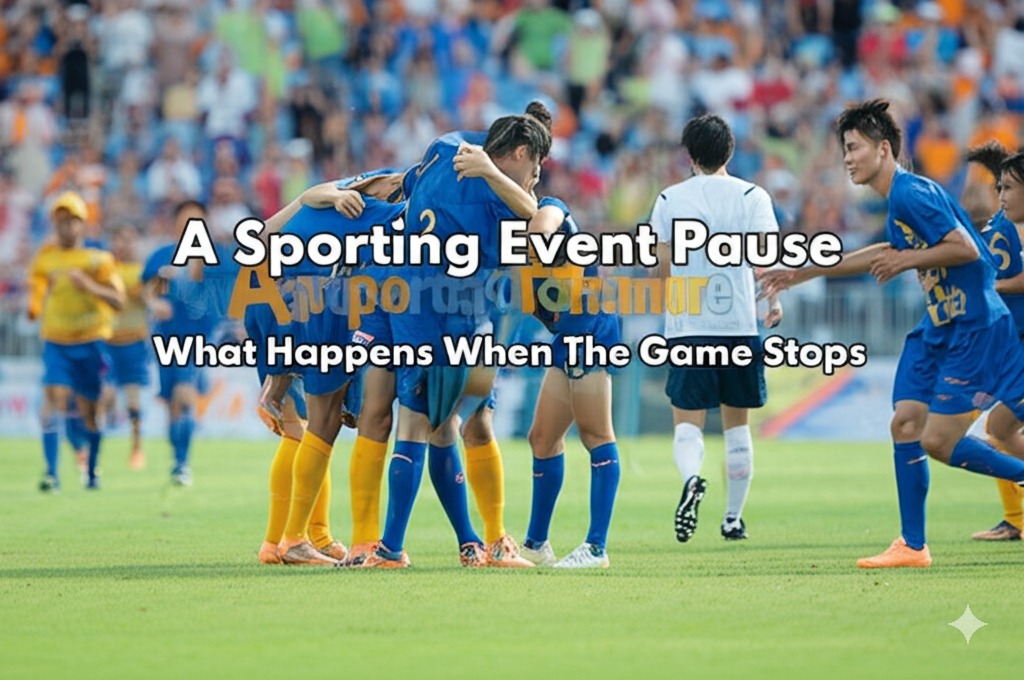Sporting events are a cornerstone of global entertainment, rallying fans, fueling economies, and fostering unity. But what happens when the whistle blows—not to start the game—but to pause it unexpectedly?
Whether due to weather, injuries, political unrest, or global events like a pandemic, a pause in a sporting event can ripple far beyond the stadium. Let’s dive into the multifaceted impact of these interruptions and why understanding them matters for fans, athletes, and organizers alike.
Why Sporting Events Get Paused
Pausing a major game isn’t taken lightly. The reasons behind these interruptions vary, and they can have significant consequences for everyone involved.
1. Weather-Related Disruptions
From thunderstorms to snowstorms, extreme weather is a common culprit in halting play. Outdoor sports like baseball, football, or tennis are especially vulnerable.
- Rain delays can make fields unplayable or dangerous.
- Lightning presents a direct threat to player and fan safety.
- Snow and ice can lead to rescheduling or even cancellation.
These conditions force officials to prioritize safety while attempting to maintain the event’s integrity.
2. Injuries and Medical Emergencies
When a player suffers a serious injury, the game often stops to allow immediate medical attention. Sometimes, entire matches are suspended if the injury is traumatic or the athlete requires hospitalization.
High-profile examples, such as Christian Eriksen’s collapse during Euro 2020, show how pauses can become moments of global concern and solidarity.
3. Technical or Logistical Failures
In today’s high-tech sporting arenas, equipment malfunctions or power outages can cause temporary halts.
- Stadium lighting failures
- VAR (Video Assistant Referee) system issues
- Broadcast interruptions
These pauses are usually resolved quickly but highlight the reliance on technology in modern sports.
4. Political or Social Interventions
Sport doesn’t exist in a vacuum. At times, political protests or civil unrest have interrupted games.
In 2020, many teams in leagues like the NBA and MLS paused games in solidarity with the Black Lives Matter movement. These pauses were deliberate, powerful statements echoing far beyond the sport itself.
Impact on Athletes and Teams
A sudden pause can throw off an athlete’s rhythm and affect both physical and mental performance.
1. Loss of Momentum
Teams on a scoring streak or players in a groove may find it hard to regain their flow after a break. Momentum is a real asset in sports, and stopping mid-game can reset the psychological battlefield.
2. Risk of Injury
Extended pauses, especially in cold conditions, can increase muscle stiffness and the risk of injury when play resumes. Athletes often use warm-up routines to stay loose during breaks.
3. Strategic Reassessment
Coaches use pauses to adjust game plans, rally their teams, or exploit changes in the opponent’s energy or strategy. A well-timed break can become a turning point in a match.
The Fan Experience During a Pause
Pauses don’t just impact the field—they also affect fans, both in the stadium and watching from home.
1. Frustration and Uncertainty
Fans invest time, money, and emotions into games. Unexpected delays can lead to:
- Frustration and confusion
- Missed transportation
- Broadcast interruptions
2. Heightened Engagement
Interestingly, some pauses spark even more interest. Social media erupts with speculation, analysis, and memes, keeping fans engaged even when the action stalls.
3. Behind-the-Scenes Glimpses
Some broadcasters fill pauses with locker room insights, interviews, or replays, offering fans content they wouldn’t otherwise see.
Economic and Logistical Consequences
1. Financial Repercussions
Postponing or pausing events can cost millions:
- Refunds and ticket issues
- Loss of broadcast revenue
- Sponsorship adjustments
The 2020 Tokyo Olympics, delayed due to COVID-19, reportedly cost Japan over $2.8 billion in added expenses.
2. Scheduling Chaos
When a season is tightly packed, rescheduling even one event creates a domino effect. It can lead to:
- Fixture congestion
- Player fatigue
- Uneven competition
Leagues and governing bodies must navigate this chaos carefully to ensure fair play and balance.
How Leagues and Organizers Prepare
Preparation is key. Major leagues have protocols in place to handle pauses efficiently.
1. Contingency Planning
From weather simulations to emergency drills, organizers plan for a range of scenarios. This ensures:
- Rapid decision-making
- Player and fan safety
- Minimal disruption
2. Communication Strategies
Clear, timely communication is essential. Fans, broadcasters, and teams rely on updates to stay informed and adjust accordingly.
Notable Sporting Pauses in History
Let’s look at a few iconic examples where the pause became as memorable as the game itself:
- 2020 Pandemic Shutdown: Virtually all global sports came to a halt. It marked an unprecedented moment in history, reshaping the sports world.
- Super Bowl XLVII Blackout (2013): A 34-minute power outage paused the biggest game in American football, flipping the game’s momentum.
- Wimbledon Rain Delays (pre-roof era): Tennis fans endured hours, even days, of delays before the All England Club added retractable roofs.
These events underscore the unpredictability of sports—and the resilience of those who make it happen.
Conclusion: When the Game Pauses, the World Pays Attention
A pause in a sporting event is more than a temporary break—it’s a moment of reflection, adaptation, and resilience. Whether it’s caused by nature, technology, or social movements, each pause tells a story about the human side of sports.
Next time your favorite game pauses, consider what’s happening beyond the scoreboard. The silence might just be part of something bigger.
Stay engaged, stay informed—and never underestimate the power of a pause.

Yara Bryant is a dedicated sports journalist with a knack for breaking down game strategies and delivering in-depth analysis. With a strong background in sports coverage, she specializes in football, basketball, and motorsports, bringing fans the latest news, insights, and predictions.


No responses yet